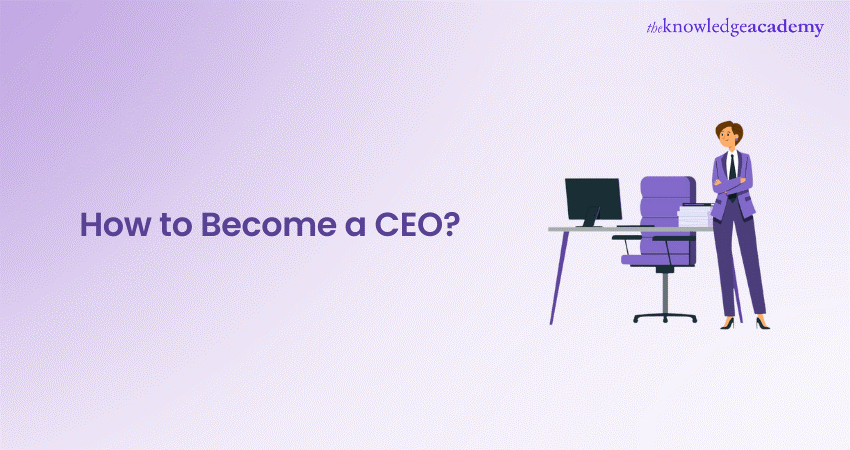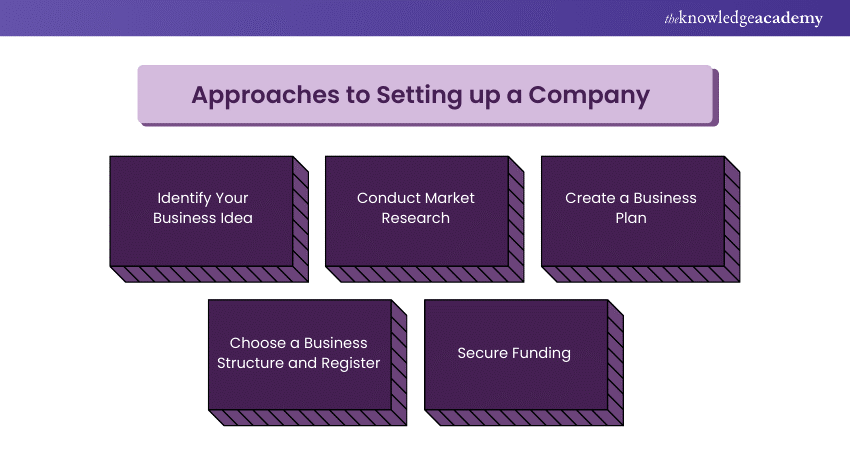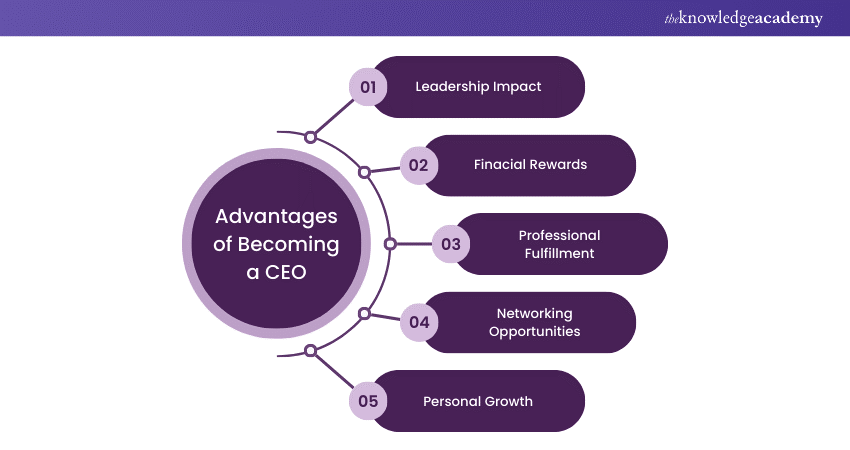We may not have the course you’re looking for. If you enquire or give us a call on +49 8000101090 and speak to our training experts, we may still be able to help with your training requirements.
Training Outcomes Within Your Budget!
We ensure quality, budget-alignment, and timely delivery by our expert instructors.
- CMI Level 7 Certificate in Strategic Management and Leadership Practice Training
- CMI Level 7 Diploma in Strategic Management and Leadership Practice Training
- CMI Level 7 Diploma in Leadership Coaching and Mentoring Training Course
- CMI Level 7 Award in Entrepreneurial Practice Training Course
- CMI Level 7 Diploma in Professional Consulting Training Course

Have you ever wondered what it takes to reach the pinnacle of corporate leadership? How to Become a CEO is a question that intrigues many ambitious professionals. But have you ever wondered what skills and experiences are essential for this prestigious role? Becoming a CEO is a fascinating journey, and it’s natural to wonder about the skills and experiences needed for this prestigious role.
Whether you’re just starting your career or aiming for a strategic leap, understanding How to Become a CEO is crucial. In this blog, we’ll explore actionable insights and expert advice to help you chart your course toward the top. Let’s dive in and uncover the secrets behind climbing the corporate ladder!
Table of Contents
1) Who is a Chief Executive Officer (CEO)?
2) How to Become a CEO?
3) Important Skills for a CEO
4) Responsibilities of a CEO
5) Benefits of Being a CEO
6) Conclusion
Who is a Chief Executive Officer (CEO)?
The CEO, or Chief Executive Officer, occupies the pinnacle position within a company, holding the ultimate responsibility for its overall success. While they regularly seek counsel and input from other top-level executives, the CEO is the decisive authority in all final managerial decisions. Other titles synonymous with the CEO include President, Managing Director, and Chief Executive. The role of a CEO can differ considerably across various industries, reflecting the unique challenges and demands each sector presents.
In addition to strategic decision-making, a CEO is often the face of the company, representing it in public and to stakeholders. They are tasked with setting the vision and direction of the company, ensuring that it remains competitive and profitable. CEOs must be adept at navigating complex business environments, adapting to market changes, and fostering a culture of innovation and excellence within the organisation.
How to Become a CEO?
Though the path to becoming a CEO varies by industry and business, these steps can guide you in the right direction:
1) Pursue an Education
The journey to becoming a CEO often begins with obtaining a post-secondary degree. While you can choose a field of study that interests you, degrees in engineering and business are particularly popular among CEOs.
A Bachelor’s degree may suffice, but a master’s degree, such as an MBA, can help you advance beyond entry-level positions. Many CEOs further complete MBA courses to acquire the necessary skills for the role.
2) Seek Out Challenging Experiences
Aspiring CEOs typically seek challenges that stretch their technical knowledge and leadership capabilities. Taking on tasks you feel unprepared for can significantly enhance your skills and personal strengths. Align these experiences with your strategic path toward achieving your professional goals, positioning yourself for the CEO role, and demonstrating your ability to manage teams and lead others.
3) Obtain Certifications
Certifications can validate the skills you’ve built in your career, complementing your academic degree. They also provide opportunities to enhance your hard skills and become an expert in your field. Certifications can further bolster your leadership influence, allowing others to rely on your knowledge and experience.
4) Gain Relevant Experience
Extensive experience is essential for becoming a CEO. Starting in entry-level or mid-level positions helps you gain relevant work experience and develop the soft skills and technical knowledge required for a CEO role. Whether in a corporate career, office role, or finance position, familiarising yourself with a company’s operations and day-to-day tasks is crucial for advancing to a C-suite position.
5) Start a Company
Alternatively, you can become a CEO by starting your own company. Building your own business can be personally rewarding and teach you valuable skills. This path also demonstrates that you have the technical capabilities and leadership qualities necessary to run a company.

In some cases, you may advance within an existing company and be promoted to CEO if you show dedication and strong leadership skills.
Become a mentor of excellence with our CMI Level 7 Certificate In Leadership Coaching and Mentoring Training - join us now!
Important Skills for a CEO
The role of a CEO is highly demanding, requiring an exceptional skill set. Such professionals are responsible for the overall success of their organisation, making these qualities essential for excelling in the role. If you aspire to become a CEO, focus on developing this particular skill set:
1) Problem-solving Skills
Problem-solving is essential for a CEO, enabling them to figure out issues and develop creative solutions to ensure the company’s success. This skill requires critical thinking, data analysis, and risk identification.
To enhance problem-solving abilities, practice brainstorming, understand the root causes of problems, and remain open-minded to different solutions.
2) Communication Skills
Strong communication skills allow a CEO to effectively convey their vision and message to their team, stakeholders, and customers. Excellent communication helps build trust, foster relationships, and ensure organisational alignment.
To improve this skill, practice active listening, be mindful of body language, speak clearly and concisely, and seek feedback. Additionally, reading books on communication, taking relevant courses, and networking with industry professionals can further strengthen this skill.
3) Leadership Abilities
A CEO sets the tone and direction for the entire organisation. They need to inspire and lead their team while maintaining a broad perspective and making strategic choices. Developing strong leadership abilities also requires continuous practice and self-reflection, which can be achieved through leadership workshops, reading relevant books, and learning from mistakes.
Aspiring CEOs should also seek mentors for personalised advice on improving their leadership skills.
Responsibilities of a CEO
A CEO’s responsibilities vary based on the organisational structure and size of the business they oversee. In smaller companies, a CEO might take a more “hands-on” approach, while in larger companies, they typically focus on high-level decisions and strategies. Generally, a CEO leads and executes the long-term strategy, ensuring the business’s longevity and success. Typical tasks of a CEO are as follows:
1) Strategic Direction and Vision
a) The CEO takes charge of defining the company’s long-term goals and strategies. This includes decisions about new product lines, market expansion, and competitive positioning.
b) Establishing and communicating the company’s vision and mission to inspire and guide employees and stakeholders.
2) Leadership and Management
a) Hiring, mentoring, and overseeing the executive team to guarantee that they are aligned with the company’s goals.
b) Setting the tone for the company’s values and cultures, ensuring a positive and productive work environment.
3) Financial Oversight
a) Making decisions about where to allocate the company’s financial resources to maximise returns and support strategic initiatives.
b) Monitoring the company’s financial health, including profitability, revenue growth, and cost management.
4) Operational Management
a) Ensuring that the company’s operations are effective and efficient as well as they align with the strategic goals.
b) Handling any major crises that arise, ensuring minimal disruption to the company’s operations.
5) Stakeholder Communication
a) Reporting to and collaborating with the board of directors to ensure alignment on strategic decisions.
b) Acting as the public face of the company, representing it in media, investor meetings, and other public forums.
6) Growth and Development
a) Figuring out and pursuing new business opportunities, partnerships, and markets to drive growth.
b) Encouraging innovation within the company to stay ahead of industry trends and competitors.
7) Compliance and Governance
a) Making sure that the company complies with all related laws and regulations.
b) Upholding strong corporate governance practices to tackle the trust of shareholders and other stakeholders.
Unlock your leadership potential with our CMI Level 7 Diploma in Strategic Management and Leadership Practice Course - register now!
Benefits of Being a CEO
Becoming a CEO comes with numerous advantages that extend beyond the prestige of the title. This role presents a unique blend of professional and personal rewards, making it a highly sought-after position. From shaping the future of a company to enjoying significant financial benefits, the perks of being a CEO are substantial. Here are some key benefits of being a CEO:

a) CEOs have the power to shape the direction of their companies and influence industry trends through strategic decisions.
b) CEOs typically receive substantial compensation packages that include bonuses, salaries, stock options, and other perks.
c) Leading a company can bring immense satisfaction, especially when witnessing the positive impact of your decisions on employees and stakeholders.
d) CEOs often interact with influential figures, widening their professional networks and opening doors to partnerships and collaborations.
e) The role challenges CEOs to continually learn and grow, honing their leadership skills and fostering resilience in dynamic business environments.
Become a strategic leader with our CMI Level 7 Award In Strategic Management And Leadership Practice Course - sign up now!
Conclusion
Becoming a CEO is a journey filled with challenges, growth, and unparalleled opportunities. By following the strategies outlined in our "How to Become a CEO" blog, you can transform your aspirations into reality. Embrace the journey and let your leadership potential shine!
Become a Consulting Leader with our CMI Level 7 Award In Professional Consulting Training - book your spot now!
Frequently Asked Questions

Yes, a CEO (Chief Executive Officer) is the top executive in a company, often considered the ultimate authority and leader of the organisation, responsible for making strategic decisions and overseeing operations.

Qualifications for a CEO typically include extensive experience in leadership roles, a track record of successful management, strategic vision, and often advanced education such as an MBA or relevant industry certifications. CEOs are chosen based on their ability to steer companies towards growth and profitability.

The Knowledge Academy takes global learning to new heights, offering over 30,000 online courses across 490+ locations in 220 countries. This expansive reach ensures accessibility and convenience for learners worldwide.
Alongside our diverse Online Course Catalogue, encompassing 17 major categories, we go the extra mile by providing a plethora of free educational Online Resources like News updates, Blogs, videos, webinars, and interview questions. Tailoring learning experiences further, professionals can maximise value with customisable Course Bundles of TKA .

The Knowledge Academy’s Knowledge Pass, a prepaid voucher, adds another layer of flexibility, allowing course bookings over a 12-month period. Join us on a journey where education knows no bounds.

The Knowledge Academy offers various CMI Level 7 Trainings, including the CMI Level 7 Award in Strategic Management and Leadership Practice Training, CMI Level 7 Diploma in strategic Management and Leadership Practice Training, and CMI Level 7 Certificate in Leadership Coaching and Mentoring Course. These courses cater to different skill levels, providing comprehensive insights into Business Policy And Strategic Management.
Our ILM, CMI Leadership & Management Blogs cover a range of topics related to CMI Leadership Management, offering valuable resources, best practices, and industry insights. Whether you are a beginner or looking to advance your ILM, CMI Leadership and Management skills, The Knowledge Academy's diverse courses and informative blogs have got you covered.
Upcoming ILM, CMI Leadership & Management Resources Batches & Dates
Date
 CMI Level 7 Award in Strategic Management and Leadership Practice Training Course
CMI Level 7 Award in Strategic Management and Leadership Practice Training Course







 Top Rated Course
Top Rated Course



 If you wish to make any changes to your course, please
If you wish to make any changes to your course, please


